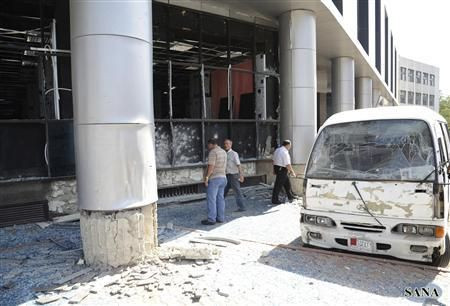Al-Qaeda-Linked Group Kills 100 In Suicide Attacks In Damascus

A group with links to al-Qaeda said they struck President Bashar al-Assad’s Air Force Intelligence compound in Damascus in a pair of suicide bomber blasts, one of which was in an ambulance loaded with bombs, Agence France Presse reported.
At least 100 people were killed or wounded in the hits late on Monday, Reuters said. No official number has been released, but director for the U.K.-based Syrian Observatory for Human Rights Rami Abdel Rahman told the AFP that “Dozens of people were killed” and that “the fate of hundreds of prisoners being held in the basements of the (building) is still unknown.”
"The regime has not said a word about what happened last night," he added.
A witness told Reuters that “Big shockwaves shattered windows and destroyed shop facades. It felt as if a bomb exploded inside every house in the area."
The militant group Al-Nusra Front To Protect The Levant stepped forward to claim responsibility, releasing a statement that said the “attack was in revenge for those who have oppressed or killed Muslims.”
"The decision was taken to hit Air Force Intelligence because it is one of the most notorious security divisions, and a citadel of repression whose extent is known only to God," the group said in an online jihadist forum, Reuters reported.
The operation was conceived as a three-phase attack, the AFP reported, in which a suicide bomber drove a car loaded with nine tons of explosives into the front of the building, and 25 minutes later, another fighter drove through with the booby-trapped ambulance.
The U.N. and the U.S. say that al-Nusra is linked to al-Qaeda, and the group is suspected of having orchestrated the May 10 bombings in Damascus.
Shortly after the attack, a gun battle broke out, and the military began shelling the building and the surrounding area.
The same day, the Syrian army, which is loyal to Assad, launched more shells in the direction of Aleppo and continued its siege of Homs.
This is the latest in a string of suicide bombing attacks: In late September, the General Staff Command Building in Damascus was the target of two large explosions, for which the Free Syrian Army claimed responsibility, AP said.
© Copyright IBTimes 2025. All rights reserved.






















